Are the MasterClass celebrity-taught online courses actually worth the money?
Online classes from super-famous people work precisely because they're inspirational, not practical.

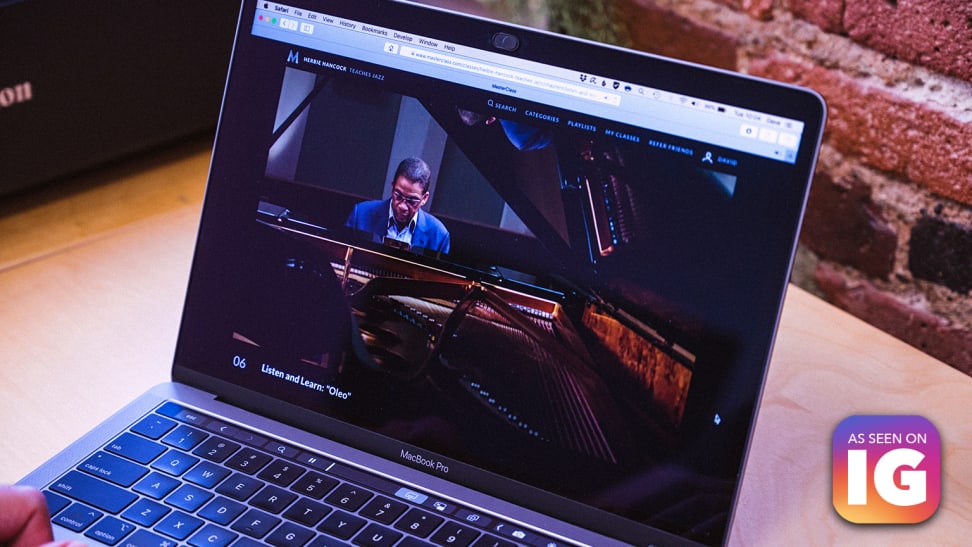 Credit:
Reviewed / Jackson Ruckar & Naidin Concul-Ticas
Credit:
Reviewed / Jackson Ruckar & Naidin Concul-Ticas
Products are chosen independently by our editors. Purchases made through our links may earn us a commission.
We at Reviewed are just as curious about those flashy products we see in our Instagram feeds as you are. For our 'As Seen On IG' series, our writers buy them and put them through their paces to find out if they're actually as good as they look online—or too good to be true. Spot one that we've missed? Email us at [email protected].
The last thing I want in my house is more stuff. A feeling of dread creeps in with each gift-giving holiday, and my stock answer to "what do you want for your birthday?" is for someone to come over to my house and take something. So when MasterClass (starting at $90 per class)—a star-studded streaming lecture series that aims to one-up TED Talks—crossed my radar, it struck me as an intriguing gift recommendation for people with a love of learning who don't need any more stuff in their life.
I'll admit, I had my doubts about it: an impossibly talented roster of luminaries promising to spill their secrets and finally reveal how you—you there at home!—can be just like Gordon Ramsay, Christina Aguilera, Bog Iger, or Aaron Sorkin. I dove in, enrolling in a number of classes to see whether MasterClass could deliver on the promise. For the most part, it did indeed deliver, though not always in the ways I was expecting.
So what is MasterClass, exactly?
MasterClass is an e-learning platform in which extremely famous, successful people present a series of video lectures about their working methods. Each class centers on a broad topic (e.g., "David Lynch Teaches Creativity and Film" or "Alice Waters Teaches Cooking") and is broken up into anywhere from a dozen to over 20 lessons. Each video lesson runs about 10 minutes.
There's a staggering level of talent to be found within these virtual ivy walls. At the time of this publication, MasterClass's roster contains 65+ of the most high-achieving people in their respective industries. Granted, they're mostly American, and more likely to be white males than not, but the faculty is growing steadily and you certainly can't accuse the producers of not aiming high enough.
Each lesson is accompanied by a downloadable worksheet containing bullet points recapping what was covered in the video, as well as some at-home exercises. However, they vary widely in their depth and utility.
You'll also find a fledgling online community of fellow classmates, but little-to-no interaction with the instructors themselves. Because you're not in a fixed "class" of students, you can go at your own pace through the lessons.
What it's like to take a class?
MasterClass isn't about building practical skill. It's about inspiration. It's about stepping onto a path with the greatest possible master—say, Samuel L. Jackson or Martin Scorsese—standing at the other end of it saying, "Here's how I got from where you are to where I am."
There are, of course, plenty of online education classes aimed at practical skills. Lynda.com is a perfect example, with thousands of classes devoted to teaching you professional development skills like programming or Microsoft Excel. Those classes tend to be quite dull because, regrettably, there is no "Martin Scorsese of Excel spreadsheets."
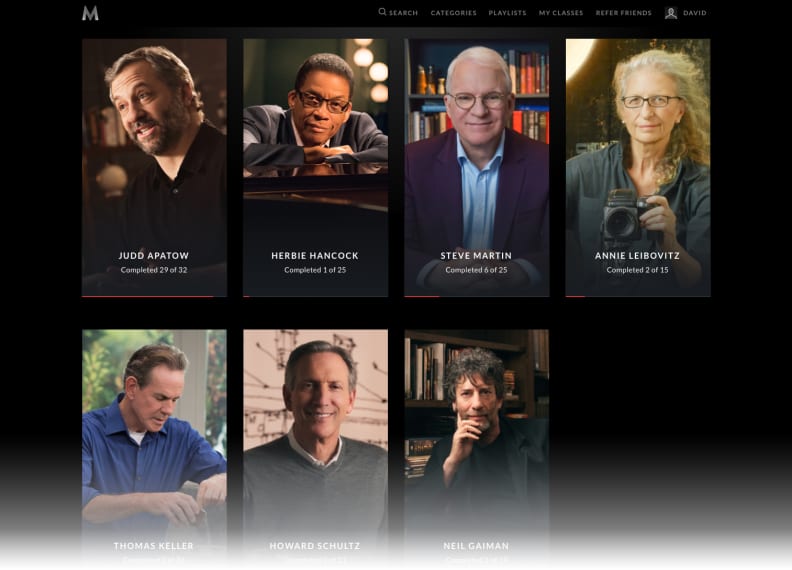
All the classes I'm currently enrolled in. With the All Access Pass, you can take as many as you want per year.
Precisely because MasterClass relies on star power to get you in the door, the curriculum tends toward the flashier vocations: filmmaking, writing, acting, cooking, photography, and the like.
That doesn't necessarily preclude those with more button-down jobs from learning what Kelly Wearstler and Anna Wintour have to say about the creative process. After all, we're all called upon for creative problem solving in our lives.
What the classes have in common
I sampled several classes across various disciplines, jumping in and out of Annie Leibowitz on photography, Thomas Keller on cooking, Herbie Hancock on jazz, and Neil Gaiman on storytelling.
The production value across all videos is uniformly outstanding. While there's a common pacing and feel to the curriculum as a whole, each class feels tailored to honor the topic and the personality of the instructor. There's nothing cookie cutter about MasterClass's approach, which is something of a miracle considering the volume at which they're currently producing.
Equally impressive is how warm, intelligent, and thoughtful the teachers appear to be in each and every one of their videos. Surely at the end of a long shooting day, these extremely in-demand icons have someplace important to be, with a long list of things to do. Yet not once did I find a perfunctory moment—a bored or exasperated instant where they muttered a half-answer before petering out and waiting for the next question. These teachers are genuinely delighted to be sharing their wisdom… or there's a consummate production team at work behind the scenes.
In-depth examples: Steve Martin Teaches Comedy / Judd Apatow Teaches Comedy
As a writer by trade, as well as a huge fan of comedy, I was most eager to start my MasterClass experience with two living legends: Steve Martin and Judd Apatow. I admire both for their craftsmanship and discipline when it comes to writing, and as they teach separate classes on the same topic, I thought it would be interesting to compare and contrast.
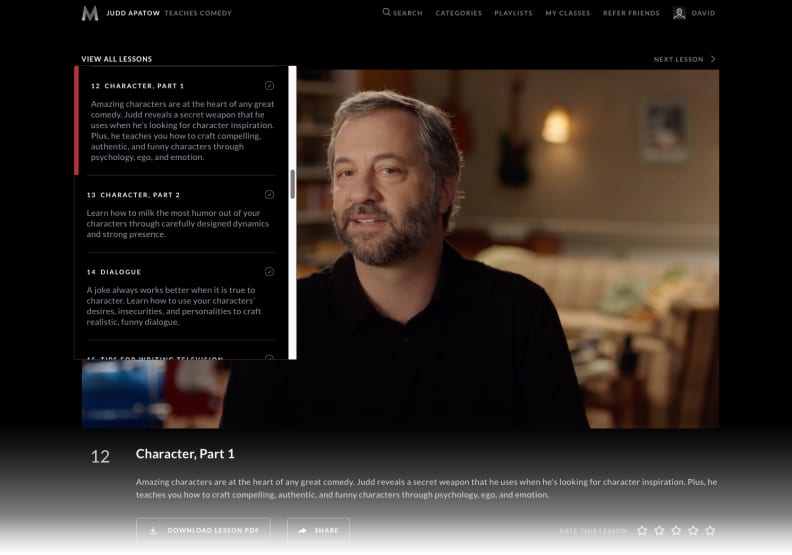
What a lesson looks like while you watch it. A drop-down menu allows you to navigate through lessons in whatever order you like.
Just starting off, the value of the $180 I'd just spent was slow to materialize. Both Martin and Apatow opened their classes with platitudes on the creative process and anecdotes from "the early days"—stories I'd already heard in dozens of interviews over the years.
Is this just a really long TED talk? passed through my mind more than once. But over the run of lessons, as the discourse ran deeper and more specific, their mastery of the subject became more evident.
In one example, Judd Apatow breaks down the pregnancy-reveal scene from Knocked Up, comparing his original script, what happened when the actors were on set working with the dialogue, and what actually made it into the final cut. He explains why certain words or phrases were elongated or rearranged for a bigger laugh or character development. Clips from the movie are intercut for illustrative purposes, but you never get the feeling that they're trying to pad the lesson for the sake of entertainment.
In another session, Steve Martin breaks from the one-man-and-a-camera format to sit down with a group of younger stand-up comedians. Putting each of the students in the hot seat, he actually takes bits from their stand-up sets and workshopping them, demonstrating how using language efficiently can set up a joke more quickly and deliver a better laugh at the punchline.
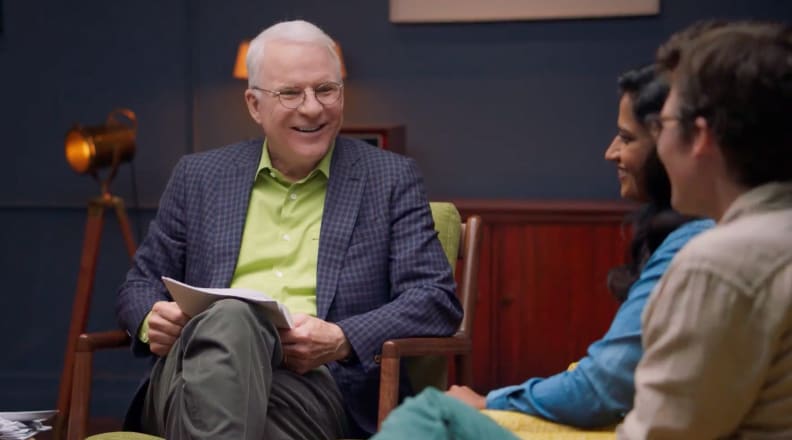
For portions of 'Steve Martin Teaches Comedy', he sits down with a small group of comedians to answer questions and workshop their material.
As someone with a master's degree in writing, I've slogged my way through a fair share of writing seminars. The lecture-portion of the MasterClass sessions were on par with anything I've attended, if not better, because—let's be honest—you're really listening when Steve Martin tells you how to restructure a sentence.
The clear downside to MasterClass is that you're not the one in that room with Steve Martin and Judd Apatow is punching up his script, not yours.
The true value of a traditional classroom environment is that it's interactive: You can ask questions and get immediate feedback on your work. MasterClass has its Community message board that tries to meet that need, but it falls short. More on that at the end of this review.
That said, there's intrinsic value in sitting at the feet of a master and just soaking it in.
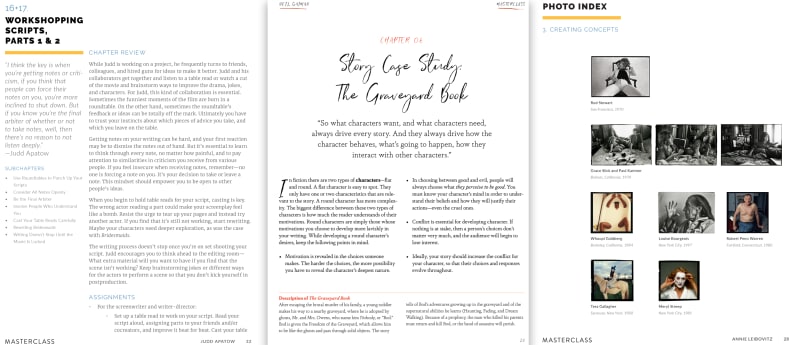
Examples of some worksheets from the classes of Judd Apatow, Neil Gaiman, and Annie Lebowitz (left to right).
How much does MasterClass cost?
Individual MasterClass classes cost $90. While the All Access Pass is twice the price at $180/year, it's by far the better deal. Once you take a class, the desire to take a second is overwhelming. You've heard what Judy Blume has to say about creating plot structure, but what's Neil Gaiman's take on it? With a subscription, you have access to the whole library.
The downside is that there's no month-to-month subscription; it's a whole year or nothing.
There's also no (legal or simple) way to download the videos permanently. You may have signed up because of a single teacher only to have that video disappear at some point. This has already happened at least once, with Kevin Spacey coming on board in 2016 only to have him dropped—for ample reasons—a year later.
How do you cancel MasterClass?
If you purchased a single class, there's no need to cancel your account. However, if you're dissatisfied, you can ask for a refund within 30 days of purchase.
If you want to cancel your MasterClass subscription, go to your Account Settings page (you'll need to be logged first), find the box labeled Subscription, and click Cancel. Follow instructions from there.
Downsides: A mostly one-sided conversation
MasterClass is not without its shortcomings. The biggest problem is the lack of interaction with the teachers. To be fair, at no point do they promise in "Serena Williams Teaches Tennis" that Serena Williams will personally evaluate your backhand. But feedback is an essential part of the learning process and the conversation with the celebrity faculty is decidedly a one-way street.
Each lesson in a class is accompanied by a downloadable PDF that recaps the talking points and suggests some homework assignments. But who's grading the work? Everyone and no one, as it turns out.
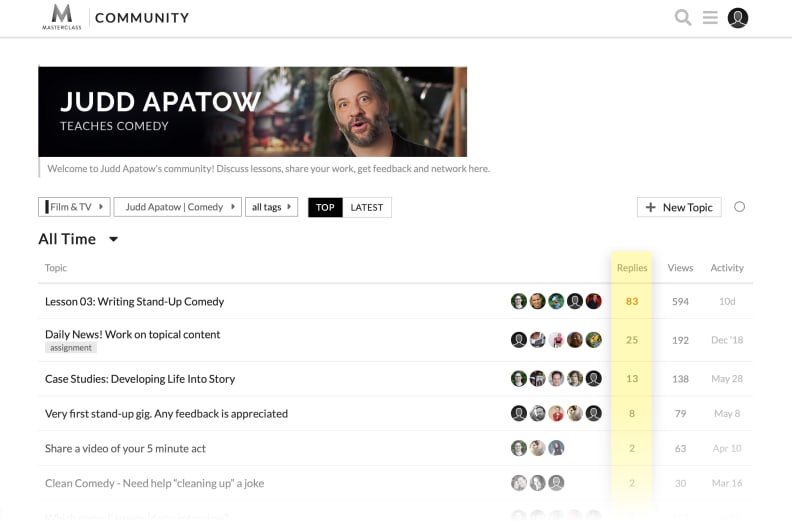
The MasterClass Community is beneficial, in theory, but note the highlighted area: The conversations dwindle quickly after the first couple of popular threads.
A Community section (possibly called "The Hub" at some point in the past) exists to create some esprit de corps between the students. However, it's plagued by three major shortcomings:
- There just aren't that many active participants outside of a few super-popular threads.
- Because students are engaging with the classes at their own pace rather than as a group, it's hard to get a sufficient number of people engaged with any one homework assignment at the same time.
- The teachers don't participate in the discussions (which likely contributes to all of the above).
Non-celebrity MasterClass staff occasionally try to get conversations going, but it appears to be an uphill battle much of the time. And the depth of the critiques, at least in the writing class discussions, falls well short of what a qualified instructor might offer—a lot of "That's great, thanks for sharing" but not much else.
There are some technical and user experience elements that could be improved, as well. The MasterClass interface seems to be very bad at remembering where you left off in a lesson. I was routinely routed back to the beginning of Chapter 1 when I should be been bookmarked at halfway through Chapter 5 or 6.
It would also be great if you could watch lessons on a TV more easily. Currently, you can only view MasterClass videos on a browser, through the MasterClass app, or on the Apple TV. But if you have a Roku or other streaming content platform, there's no simple way to watch the videos on a television.
Should you get MasterClass?
Much of what you get from MasterClass could be cobbled together from TED talks, Fresh Air interviews, YouTube instructionals, and classes at your local community college. And if you're serious about any of these endeavors, hopefully you've already taken those steps.
MasterClass is about lighting the spark inside you. Personally, I found the classes incredibly motivating, even if I have no intention of following down the same career path as, say, astronaut Chris Hadfield or designer Ron Finley.
For those lessons that you can apply more practically to your life, the moments that make MasterClass worth it are those that dig into the grunt work—the unsexy details of their craft that rarely see daylight in talk show segments and magazine interviews.
There is absolutely no downside to listening to brilliant people talk about how they work. While that knowledge be found for free on various media, MasterClass has done an impressive job of serving it up on a meticulous platter that will keep you engaged for a long time.


